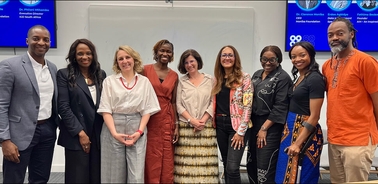‘Gurus and Griots’ – Africa’s Leadership Renaissance: Youth, Data, and Strategy in a Changing Global Order

In a time of accelerated global realignment, Africa’s leadership potential is gaining renewed attention. The Global Policy Center’s (GPC) Africa Progam hosted on may 20th, 2025, a high-level panel titled "Gurus and Griots – Africa’s Next Power Play: Policy, Capital and Leadership in a Shifting Global Order", spotlighting how youth, data, and strategic partnerships are reshaping Africa’s position in global affairs.
The event brought together influential voices from across the continent and the diaspora, including Dr. Clarence Moniba (Moniba Foundation), Erdoo Agbidye (Data Management Specialist), Fathima Beckmann (AIH Founder), Osayi Alile (ACT Foundation CEO), and Dr. Philani Mthembu (IGD South Africa Executive Director). Together, they addressed the continent’s strategic leverage and the leadership transitions needed for inclusive growth and global influence.
Data Literacy and Digital Governance: Africa’s Young Leaders Lead the Way
Erdoo Agbidye highlighted the urgency of building interoperable data systems and digital governance frameworks. According to her, data literacy must become a prerequisite for leadership across Africa. She stressed the role of Africa’s digitally savvy youth in closing the leadership gap and driving innovation in public service.
Agbidye called for stronger public-private collaboration to bridge the urban-rural digital divide, scale digital entrepreneurship, and build education-to-employment pipelines in the public sector. Her remarks pointed to the centrality of digital transformation in Africa’s development agenda.
Inclusive Governance and the Power of Youth Co-Creation
Fathima Beckmann emphasized the need for diverse, inclusive, and intergenerational leadership models in Africa. She advocated for co-creation with the continent’s youth, who bring fresh perspectives on equity, global interconnectivity, and social justice. Beckmann also underscored the strategic importance of the African diaspora in building global alliances and reshaping narratives.
She called for new platforms that promote critical thinking, reciprocal learning, and shared leadership, stressing that isolation is no longer viable in a hyper-connected world.
Grassroots Leadership and Women’s Voices in Policy
Osayi Alile shared insights on grassroots leadership in Africa, weighting the importance of community engagement, listening, and proactive policy design. She urged African leaders to move beyond reactive crisis management and embrace long-term thinking rooted in trust and shared prosperity.
Alile also addressed the structural barriers faced by women in politics, arguing that representation must translate into influence. She called for narrative change, public visibility of women’s impact, and policy incentives to elevate female leadership in governance and economic decision-making.
Crisis Preparedness and the Call for Transformational Politics
For Dr. Clarence Moniba, leadership and crisis management must begin with prevention and infrastructure readiness. Crises across African countries, he noted, often expose the consequences of reactive governance. Moniba advocated for transformational leadership that attracts young Africans into politics, not for power, but for sustainable development and inclusive reform.
Africa’s Strategic Leverage in Global Geopolitics
Dr. Philani Mthembu delivered a powerful reminder of Africa’s geopolitical value. With its rich natural resources, growing middle class, and digital potential, Africa holds key assets for the global green and digital transitions. He stressed that regional integration and local value chains are essential to ensuring foreign direct investment benefits African societies.
Mthembu also called for African leaders to re-negotiate global partnerships from a position of strength, grounded in confidence, cooperation, and a clear development vision. Africa, he argued, is the world’s poorest continent with the richest people—and that paradox must be transformed through investment in education, healthcare, and infrastructure.
A New Generation of African Leadership Is Emerging
This high-level event revealed a clear consensus: Africa’s next chapter will be written by its youth, its women, its innovators, and its communities. From digital transition and data governance to inclusive policymaking and grassroots empowerment, Africa is not just adapting to global change—it is actively shaping it.
In the words of one speaker: "Africa doesn’t need to wait for a seat at the table. We’re building our own".